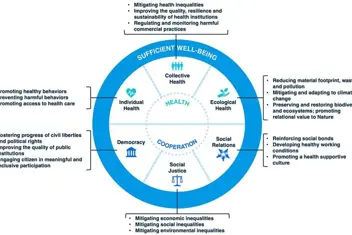Updated October 2025: The Wellbeing Economy Toolbox is now live and can be accessed by clicking here.
The Wellbeing Economy Forum, a key event within the JA PreventNCD, took place in Reykjavík, Iceland on 8–9 May 2025. Bringing together policymakers, researchers, and advocates from across Europe, the forum provided a platform to exchange ideas and showcase tools for advancing health and wellbeing across sectors.
As part of the programme, Aurore Fransolet, a Postdoctoral Researcher in Ecological Economics at Sciences Po Paris and member of the Wellbeing Economy team in JA PreventNCD, delivered a presentation and a workshop on the Wellbeing Economy Toolbox, which she is developing alongside Éloi Laurent. Following her session, Aurore offered deeper insights into the toolbox’s vision, development process, and future plans.
The Vision Behind the Toolbox
Aurore explained that the Wellbeing Economy Toolbox is designed to showcase the variety of policies currently implemented throughout Europe that embody the Wellbeing Economy (WBE) approach. The goal is to mainstream this concept and inspire policymakers, stakeholders, and other actors to contribute to transforming the economy into a model that prioritises societal wellbeing within planetary limits.
Aurore describes their definition of WBE as:
The Wellbeing Economy is a post-growth economy that generates sufficient human wellbeing by fostering health and cooperation.
There are two core components and six dimensions that define the WBE.
- Health: Individual health, collective health, ecological health.
- Cooperation: Social relations, social justice and democracy.
These WBE dimensions are broken down into 18 actionable domains (see figure).
The Wellbeing economy toolbox would be an online tool, going from conceptualising and operationalising the WBE to mapping existing and emerging WBE policies in Europe.

The 18 actionable domains of the wellbeing economy (source: Fransolet & Laurent, 2025)
Successful High-Level Workshop at the Forum
The workshop took place on the second day of the Wellbeing Economy Forum and was a great success. Its main objective was to enrich the toolbox by identifying both existing policies that have proven especially effective in promoting a WBE, and emerging policies seen as particularly promising in advancing this alternative economy. The event was kept small and by invitation only, with around 15 participants. These included selected conference speakers chosen for their diverse expertise, geographic representation, and professional backgrounds, such as policymakers and scientists. Aurore shared that she received valuable feedback and insighful inputs from the group. It was a small room but full of excellent ideas and she plans to hold similar workshops in the future.
Ongoing Survey and Stakeholder Engagement
Furthermore, the team is currently conducting a survey to gather further feedback. Aurore shared that the survey targets a wide range of stakeholders across Europe to identify and map additional existing and emerging wellbeing economy policies across Europe. Its purpose is to support the development of the online Wellbeing Economy Toolbox, which showcases the wide range of policies that promote wellbeing within the EU’s multi-level governance framework. This resource aims to assist policymakers and stakeholders interested in advancing the wellbeing economy.
The survey findings will inform and refine the toolbox, strengthening its relevance and usability.
The survey is currently open — click here to share your policy priorities for a well-being economy in Europe!
When asked about the timeline for the toolbox’s release, Aurore indicated that following the analysis of the workshop and survey results, along with additional workshop outcomes, documentary insights, and case studies, the team aims to launch the first version of the toolbox this fall on the JA PreventNCD website. The toolbox will be organized around the 18 actionable domains and 6 types of policy instruments, resulting in a matrix of roughly 100 policy examples. Each policy will be featured as an “ID card” that includes:
- Presentation and context
- Reception
- Limitations
- Developments and future prospects
- Complementary policies to be mixed with
We thank Aurore Fransolet for sharing her work and vision for the Wellbeing Economy Toolbox. This resource promises to be a valuable contribution to the ongoing effort to shift Europe’s economies toward models that prioritise health, equity, and sustainability. We look forward to the toolbox launch later this year and to continued collaboration as part of the JA PreventNCD community.
